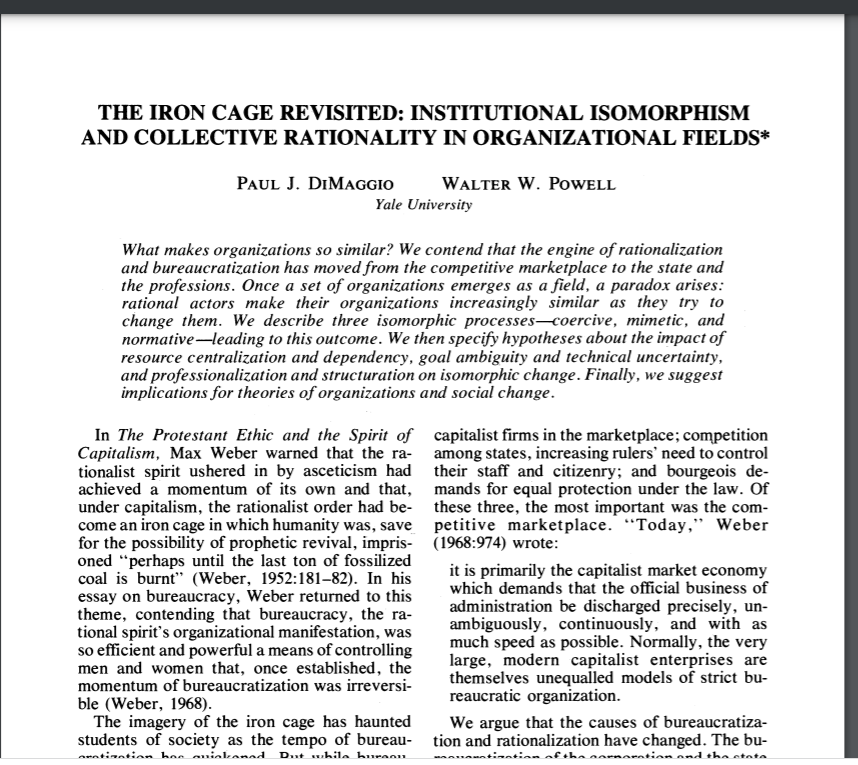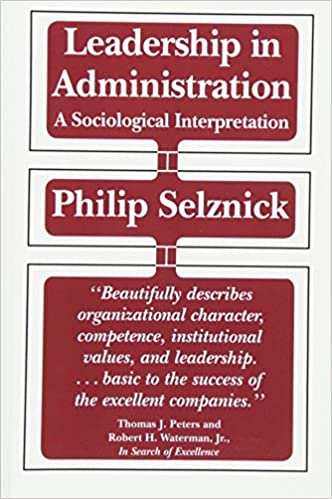
I was yesterday years old when I realized...
that the key term "mimetic" is used in opposing ways by two highly influential & great sociological analyses of importance to me:
DiMaggio & Powell (1983) & Soloveitchik (1994)
& that it's productive to think about *why*
<THREAD>



that the key term "mimetic" is used in opposing ways by two highly influential & great sociological analyses of importance to me:
DiMaggio & Powell (1983) & Soloveitchik (1994)
& that it's productive to think about *why*
<THREAD>




To be sure, the papers each use "mimetic" to describe when people (Soloveitchik) or organizations (D&P) model their behavior on others, even though (in each case) the person or organization has good reasons not to slavishly model their behavior on others.
Also, both see mimesis as something that is "taken-for-granted" to the point that it is essentially done nonstrategically & even unthinkingly. 



There are two important differences though
1/
For D&P, mimesis is within-generation: organizations observe the dominant models of our bureaucratized, capitalist economy & conform with them
The title of the paper is take-off on Weber's description of modern forms as "iron cages"
1/
For D&P, mimesis is within-generation: organizations observe the dominant models of our bureaucratized, capitalist economy & conform with them
The title of the paper is take-off on Weber's description of modern forms as "iron cages"
For S, by contrast, mimesis is inter-generational & traditional/anti-modern:
Younger Jews would observe their parents' (& grandparents' & fellow villagers') *pre-modern* practices & beliefs & reproduce them.
Younger Jews would observe their parents' (& grandparents' & fellow villagers') *pre-modern* practices & beliefs & reproduce them.
2/
For D&P, mimesis is a form of "institutional isomorphism" (it's in the subtitle!)
It's driven by the codifiable knowledge held and spread by texts & actors who stand outside of local interaction/community-e.g., consultants!
For D&P, mimesis is a form of "institutional isomorphism" (it's in the subtitle!)
It's driven by the codifiable knowledge held and spread by texts & actors who stand outside of local interaction/community-e.g., consultants!

For S, by contrast, this is the very opposite of mimesis. He bemoans the rise of intellectual/text-based sources of authority-- driven by rabbis!-- that undermine mimesis in families/communities 

Ok, so hopefully, even though you'd probably never heard of both D&P & S (not a lot of people out there who, like me, care about the questions each one engages with...) you may now be interested in the similarities & differences & curious how they can be bridged.
Three points:
Three points:
a) They're each basically talking about the same process-- what old-timey sociologists called "modernization"-- & effectively criticizing it.
They're each nostalgic for a world in which prevailing "global" practices & beliefs cd be more easily ignored in favor of "local" ones.
They're each nostalgic for a world in which prevailing "global" practices & beliefs cd be more easily ignored in favor of "local" ones.
b) It's always key to read neo-institutionalist like D&P together w "old institutionalism," which emphasizes continuity/path-dependence whereby organizations reproduce their pasts.
Here are some of my favs-- all of which could be described as *intergenerationally mimetic*



Here are some of my favs-- all of which could be described as *intergenerationally mimetic*




And I highly recommend these B&B papers, which are about the tensions between intergenerational & intragenerational pressures for institutional isomorphism: tensions that resonate with those discussed by S. 



c) The last plank of the bridge is provided by Turner (1976), who describes 2 opposing logics for claiming a "real" identity-- "impulse" vs. "institution."
I like to frame this tension as this fun question:
Are we our real selves when naked or when clothed?
I like to frame this tension as this fun question:
Are we our real selves when naked or when clothed?

I light of Turner, it makes sense for D&P to (implicitly) emphasize the institutional self: organizations are in the first instance *tools*-- like clothing.
& it makes sense for S to stress the impulse self: human beings enter the world naked & impulsive & we exit the same way
& it makes sense for S to stress the impulse self: human beings enter the world naked & impulsive & we exit the same way
But reading the papers together also reminds us of the other sides of these coins:
Organizations (like our clothing!) often come to be "infused with value" (Selznick!) & are reproduced via intergenerational mimesis to be sources of great pride!
Organizations (like our clothing!) often come to be "infused with value" (Selznick!) & are reproduced via intergenerational mimesis to be sources of great pride!

The other side is that we people are products of our times, often building great new things together-- including breathing new life (however fitfully) into old traditions in ways that would've been automatically rejected by our forbears
Example: myjewishlearning.com/article/orthod…
/FIN
Example: myjewishlearning.com/article/orthod…
/FIN
• • •
Missing some Tweet in this thread? You can try to
force a refresh













